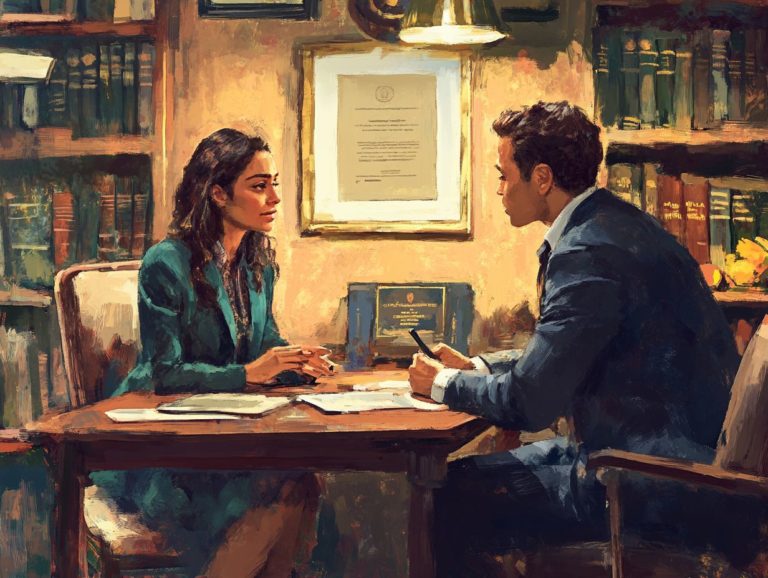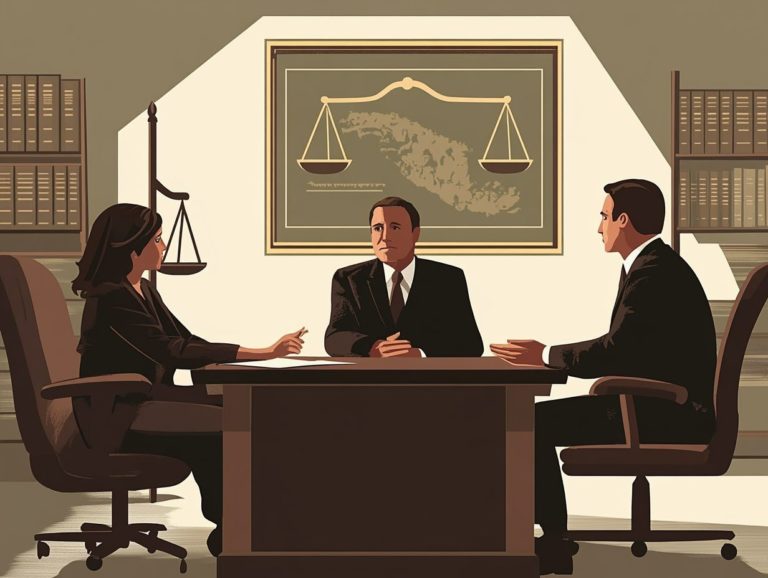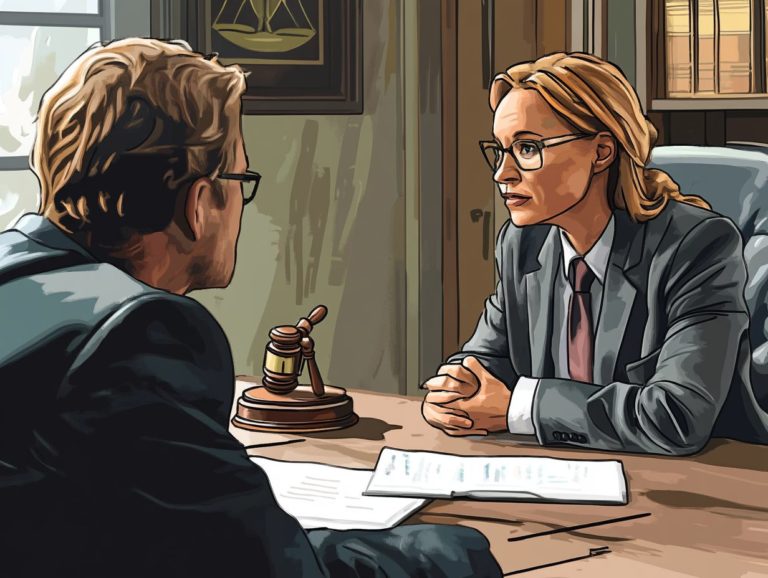5 Crucial Questions for Your Defense Attorney
The right defense attorney can greatly impact your case results. Choose wisely.
With many factors to consider, it s crucial to approach this decision with clarity and intention. This article outlines five essential questions to ask potential attorneys, focusing on their experience, case handling methods, communication styles, and fee structures.
Explore the potential outcomes and challenges, examine defense strategies, and consider collaborating with other professionals. Arm yourself with the knowledge needed to make an informed choice and secure the best possible defense for your situation.
Contents
- Key Takeaways:
- 1. What Is Your Experience and Track Record?
- 2. How Will You Handle My Case?
- 3. What Is Your Communication Style?
- 4. How Do You Charge for Your Services?
- What Are the Possible Outcomes of My Case?
- Frequently Asked Questions
- What are the five most important questions to ask a defense attorney?
- Why is it important to ask a defense attorney these five crucial questions?
- How many years of experience should a defense attorney have?
- Why is it important to know a defense attorney’s trial experience?
- What should be included in a defense attorney’s strategy for your case?
- What if I am not satisfied with a defense attorney’s answers?
Key Takeaways:
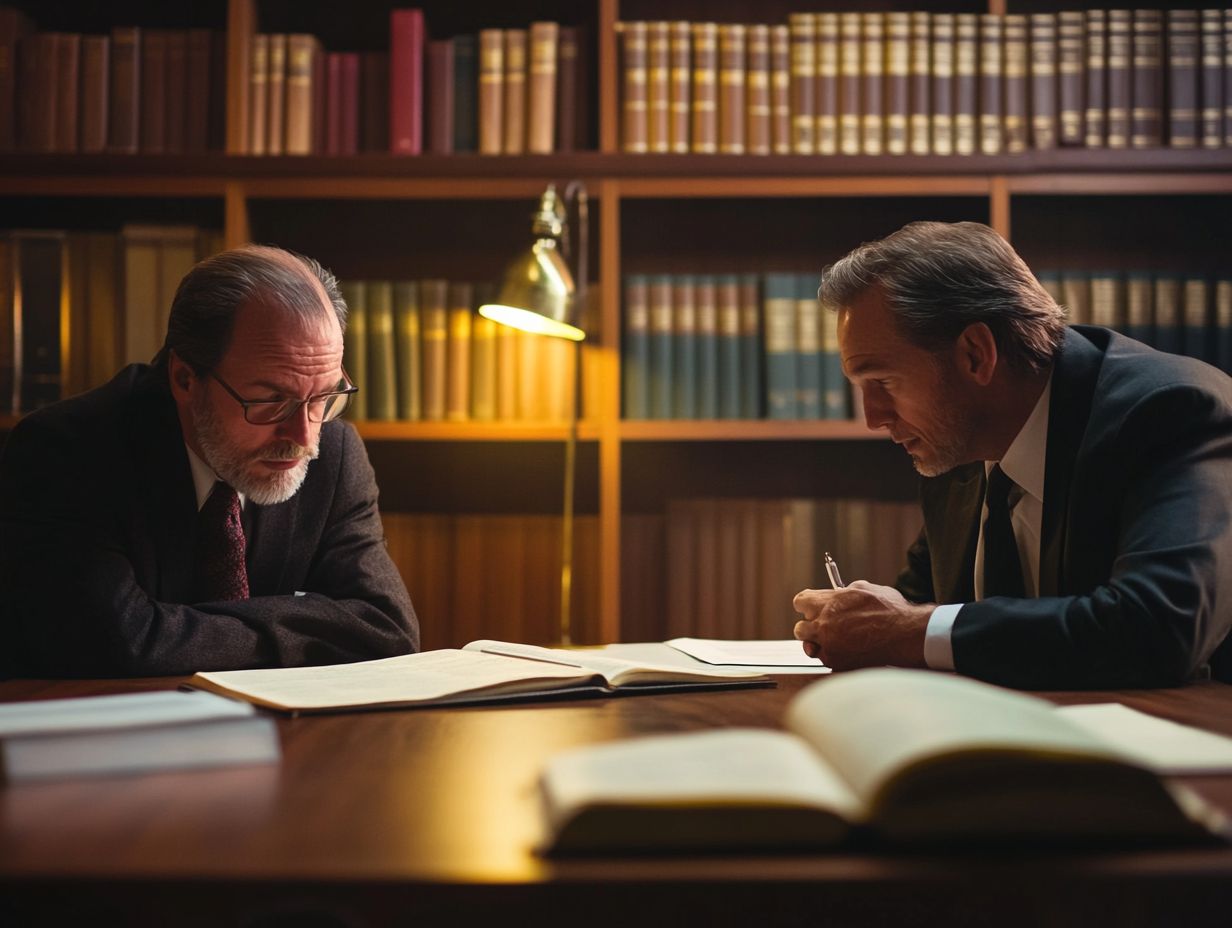
- Choose an experienced and successful defense attorney by looking into their track record.
- Discuss how your case will be handled, including communication style, fees, and potential outcomes.
- Ensure your defense attorney is transparent and keeps you informed, using various defense strategies and collaborating with other professionals.
1. What Is Your Experience and Track Record?
Your choice of a criminal defense attorney can significantly influence your case’s success. A seasoned lawyer can navigate the complexities of criminal charges, offering strong legal support tailored to your circumstances especially in Stamford, Connecticut, where local laws and courtroom dynamics can sway outcomes.
This expertise often spans various criminal defense areas, from drug offenses to serious allegations like assault or white-collar crimes. The attorney’s past case outcomes reveal their ability to secure favorable verdicts and plea deals.
Client testimonials can highlight their commitment and effectiveness, showing how past experiences translate into current success. Choosing a Stamford attorney familiar with local laws boosts your defense strategy and ensures thorough trial preparation, essential for navigating local court intricacies.
2. How Will You Handle My Case?
Handling your case effectively requires a deep understanding of criminal defense. Your attorney will create a personalized defense strategy, thoroughly check the evidence, and safeguard your legal rights during court appearances.
From your first consultation, your attorney will dive into your case’s complexities, analyzing evidence and circumstances with precision.
Establishing a strong attorney-client relationship is crucial; it fosters open communication necessary for informed decision-making throughout your legal journey. Your attorney will also explore plea bargain options tailored to your situation, weighing the benefits and risks involved.
By fostering transparency and trust, your attorney will keep you engaged in your defense strategy, ensuring you are an active participant in your legal narrative.
3. What Is Your Communication Style?
An effective communication style is vital in your relationship with your attorney. It should be characterized by open dialogue, timely updates, and a clear focus on your satisfaction. This approach builds trust, ensuring you feel informed and supported throughout the legal process.
Your attorney will prioritize various communication methods based on your preferences whether through in-person meetings, phone calls, or emails. This flexibility not only makes you comfortable but also strengthens your partnership during the stressful phases of legal proceedings.
By committing to address your questions promptly, your attorney shows dedication to your unique needs, creating a reassuring atmosphere. Proactively reaching out with updates or clarifying uncertainties can enhance case management, leading to better outcomes and boosting your confidence in your legal journey.
4. How Do You Charge for Your Services?
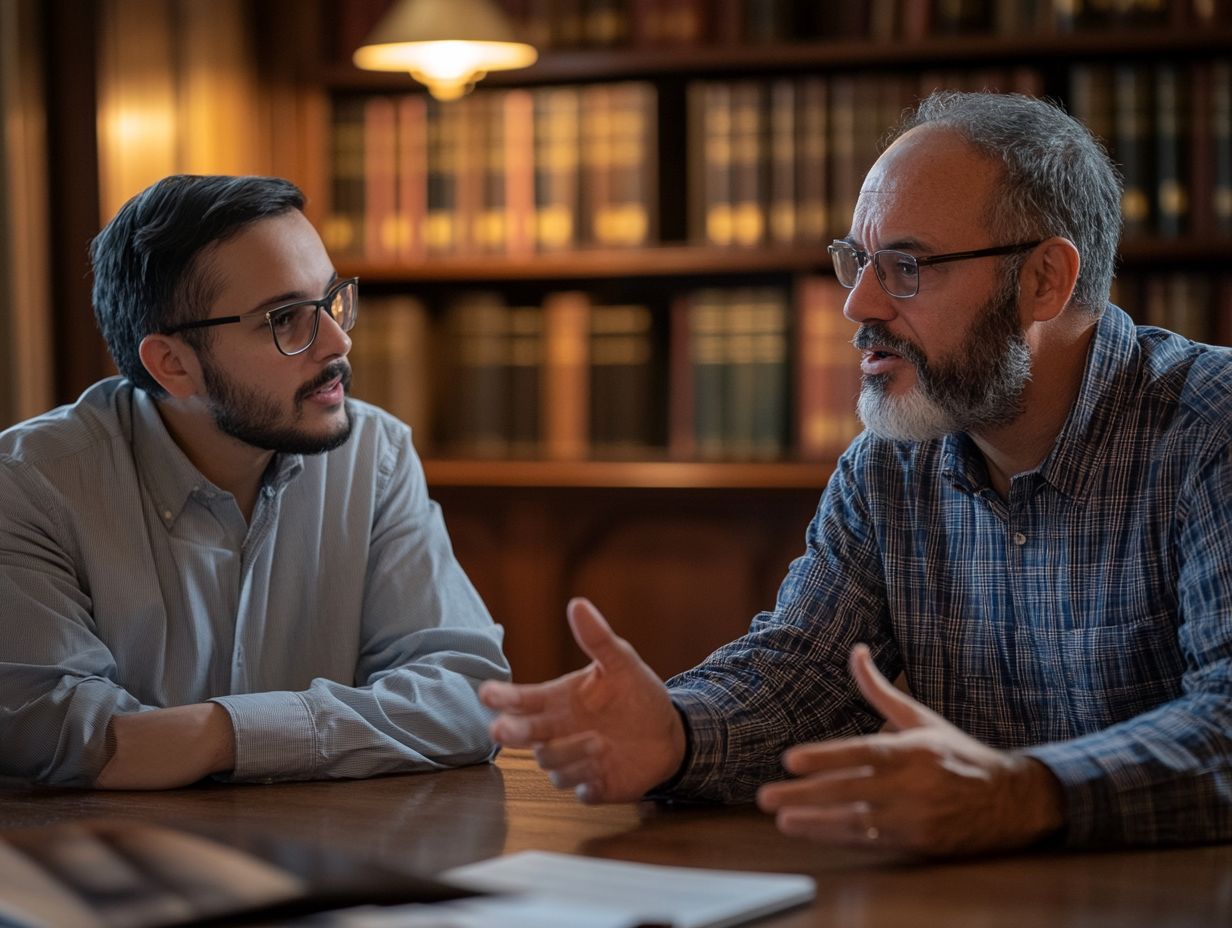
Understanding how a criminal defense attorney charges is crucial for planning your budget. Many attorneys offer fixed fees, payment plans, and free consultations, making legal support accessible.
During your first meeting, discuss legal fees openly. This helps you evaluate your options and set a budget.
Fixed fees mean you won t face unexpected costs later. Retainers require an upfront payment, with extra fees for additional services.
If upfront payments are tough, flexible plans can help you afford quality legal representation. This way, you can focus on your defense without financial worry.
What Are the Possible Outcomes of My Case?
Knowing the possible outcomes of your case helps set realistic expectations. A good attorney will explain options like plea deals, acquittals, or convictions based on careful evidence review.
Their expertise means you understand different defense strategies and their consequences. For example, a plea deal could give you a lighter sentence for a guilty plea.
Alternatively, working in court involves making strong arguments to win an acquittal. Your attorney s tailored approach boosts your chances of success and offers support during this stressful process.
What Are the Potential Challenges in My Case?
Understanding potential challenges is vital for your case’s success. Factors like evidence review and attorney-client communication can shape your defense strategy.
You might face confusing legal terms, unexpected evidence, or unclear communication about your rights. An experienced attorney identifies these issues by carefully reviewing all evidence.
This proactive method strengthens your defense. Quick action can be crucial for getting a good plea deal or preparing for a strong trial defense.
How Will You Keep Me Informed Throughout the Process?
Keeping you updated is vital for good communication. An attorney s availability reassures you and ensures you re involved in your defense.
Regular updates provide clarity on case developments. They help you navigate the complexities of your legal journey.
Having a set schedule for check-ins, like weekly emails or monthly calls, emphasizes transparency. This open communication builds trust and lets you voice concerns easily.
Ultimately, this approach empowers you to make informed decisions about your case, leading to better legal representation.
What Are the Different Defense Strategies You Can Use?
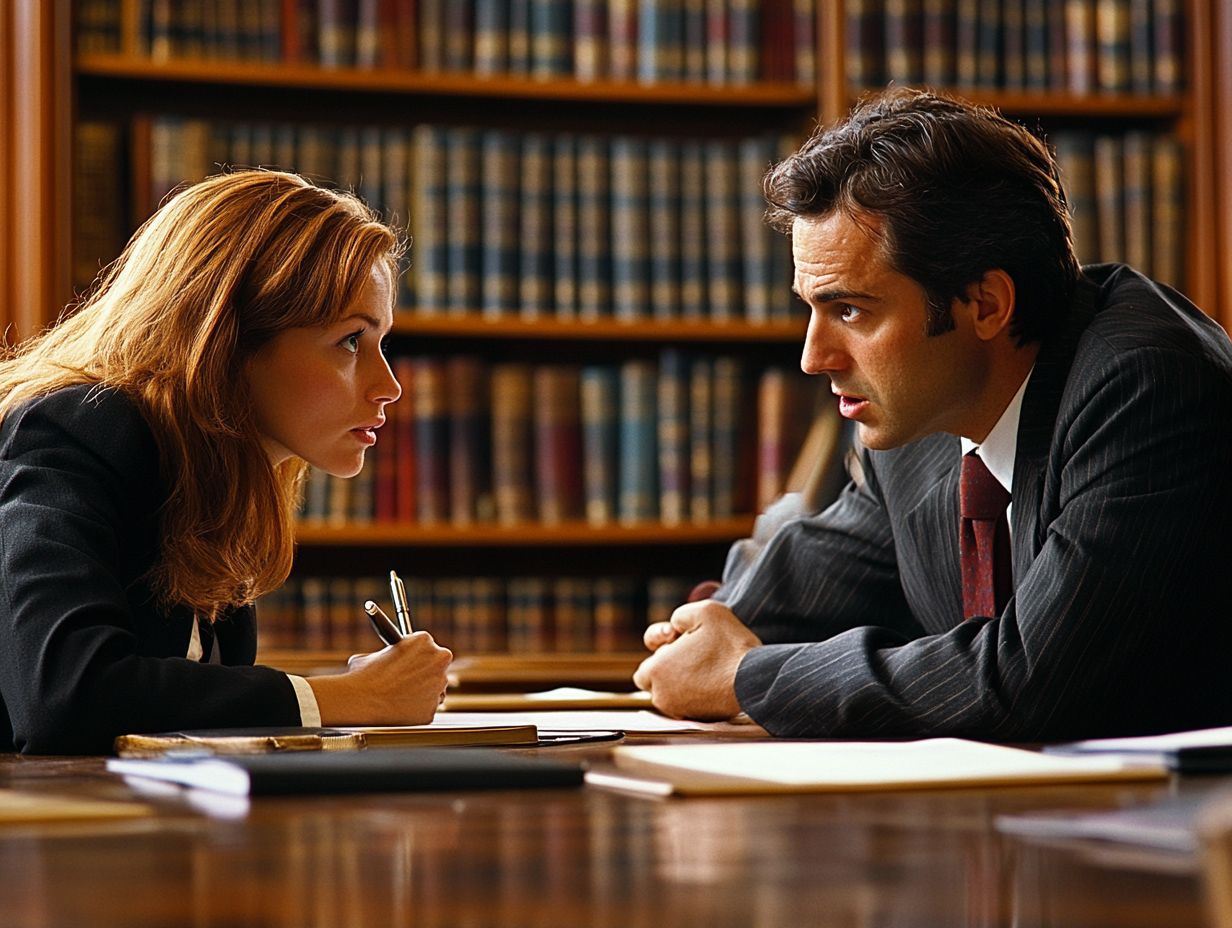
A robust defense strategy is crucial for navigating the complexities of your case. An experienced attorney will carefully examine the evidence and craft tailored courtroom strategies. This may include agreements that can reduce charges in exchange for a guilty plea to secure the best possible outcomes for you.
By scrutinizing each piece of evidence, your defense can pinpoint weaknesses or procedural issues that might render certain evidence inadmissible. This critical analysis often leads to effective challenges, undermining the prosecution’s case while strengthening your position.
Questioning the credibility of witnesses can significantly affect how their testimony is perceived in court. Each of these strategies works together to enhance the overall effectiveness of your defense while aligning with the unique circumstances of your case.
How Will You Work with Other Professionals in My Case?
Collaborating with other professionals in your case is essential for comprehensive case management. An adept attorney coordinates with experts such as investigators, forensic analysts, and legal advisors to construct a strong defense against criminal prosecution.
This cooperation is pivotal for gathering critical evidence and interpreting intricate information that might easily be overlooked. When you engage an attorney experienced in these partnerships, they can effectively transform findings into legal strategies that resonate in court.
The synergy between legal expertise and expert insights ensures a thorough review of all relevant aspects of your case, leaving no stone unturned. This multifaceted approach elevates the quality of legal representation and significantly strengthens the overall outcome, giving you the best chance at a favorable result.
What Are the Most Important Factors to Consider When Choosing a Defense Attorney?
Choosing the right defense attorney requires careful consideration of several key factors, including their availability, legal representation style, track record of client satisfaction, and overall experience in handling cases like yours.
Pay attention to the personal rapport you establish during initial consultations. A lawyer s communication style can greatly impact your experience; the best attorneys simplify complex legal jargon, making it easier for you to understand your situation.
Knowing local laws and court procedures is very useful. For instance, one client navigated a particularly intricate case where their attorney’s insights into local judicial preferences played a pivotal role in securing a favorable settlement.
It s vital to feel comfortable and confident in your choice. A strong attorney-client relationship can often be the secret ingredient to achieving successful legal outcomes.
Frequently Asked Questions
What are the five most important questions to ask a defense attorney?
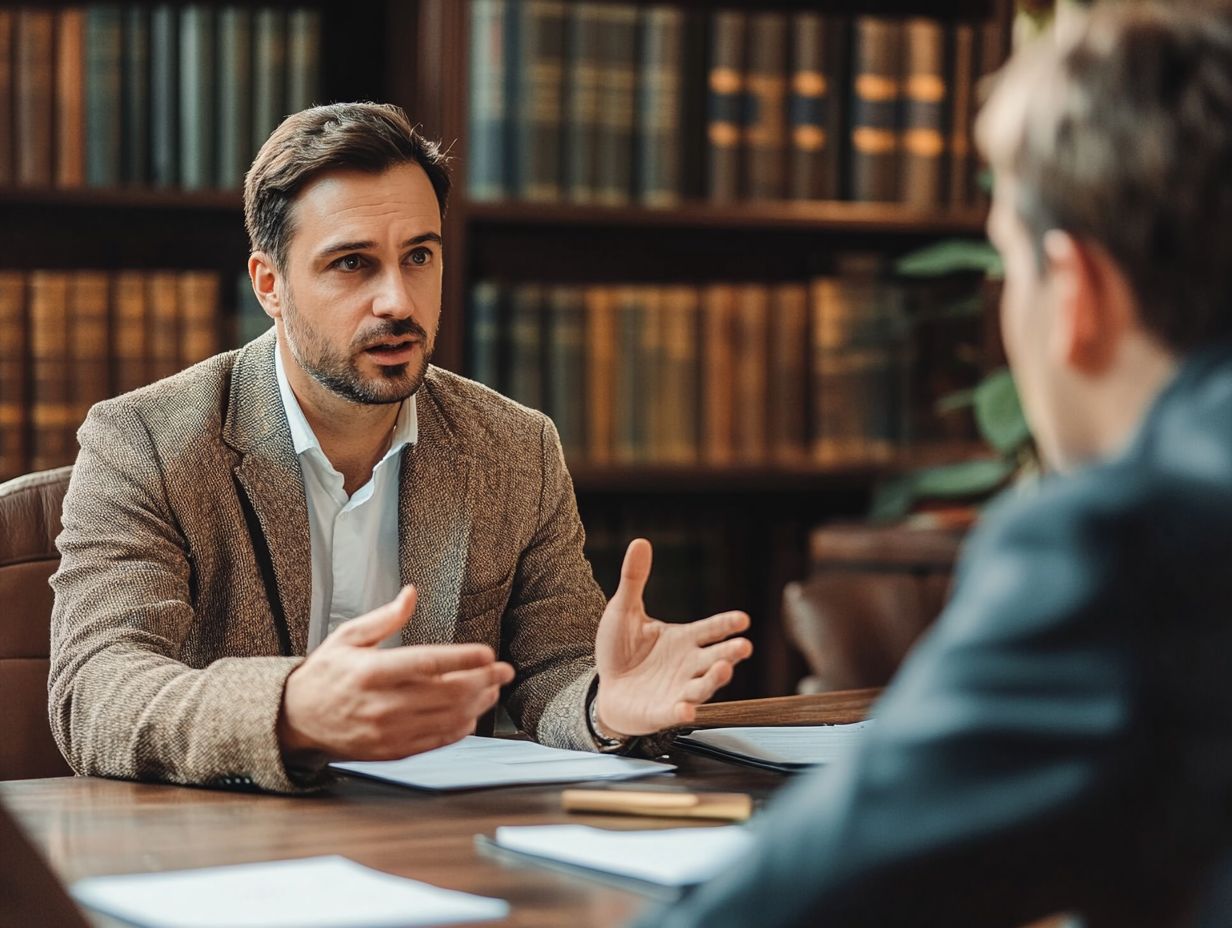
- How many years of experience do you have as a defense attorney?
- What percentage of your cases have gone to trial?
- How many cases have you won?
- What is your strategy for defending my case?
- What are the potential outcomes for my case, and how will you work towards achieving the best possible result?
Why is it important to ask a defense attorney these five crucial questions?
Asking these five crucial questions will give you a better understanding of the defense attorney’s experience, success rate, and strategy. It will also help you determine if the attorney is the right fit for your case and if they possess the necessary skills and qualifications to defend you effectively.
Take the next step by scheduling a consultation with a defense attorney today!
How many years of experience should a defense attorney have?
A defense attorney should ideally have at least 5 years of experience in criminal defense. This experience helps them understand the legal system and build relationships with prosecutors and judges.
Why is it important to know a defense attorney’s trial experience?
Knowing a defense attorney’s trial experience gives insight into their willingness and success at trial. This information is crucial to gauge their confidence and capability in defending your case.
What should be included in a defense attorney’s strategy for your case?
A defense attorney’s strategy must involve a careful examination of the evidence. They should identify any weaknesses in the prosecutor’s case and tailor a strong plan to defend you.
They also need to discuss potential outcomes and how they will work to achieve the best results for you.
What if I am not satisfied with a defense attorney’s answers?
If you’re not happy with a defense attorney’s responses, keep looking for one who meets your needs. It’s vital to choose an attorney you trust and feel comfortable with during this challenging time.


